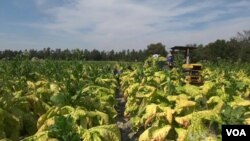WASHINGTON —
Zimbabweans have waited for the past three years for a new draft constitution to replace the Lancaster House document that brought political independence in 1980.
But the draft has been read and received differently by Zimbabweans from different walks of life. While women are happy with the charter, some are not pleased with different provisions ranging from executive powers, devolution, and citizenship, among others.
The land issue remains one of those issues bringing about division in the unity government and the general public.
Chapter Four, Section 72 of the draft recognizes the right to agricultural land but also allows the government “where agricultural land, or any right or interest in such land, is required for a public purpose,” to acquire private land.
Though the constitution makes note that adequate compensation is required, critics have charged Zimbabwe will gazette a constitution allowing the legal seizure of land.
.
The document further stipulates that any indigenous Zimbabwean whose agricultural land was acquired by the state is entitled to compensation from the State for the land and any improvements that were on the land when it was acquired.
Commercial white farmers, whose land was acquired by the state but not protected under international agreements, are only entitled to compensation for improvements.
White farmers protected under international agreements, including Bilateral Investment Promotion and Protection Agreements (BIPPA), will see Zimbabwe honour its agreement and compensate the farmers.
Organizations such as the International Socialist Organisation charge that the draft failed to compensate Zimbabwean workers affected by the land reforms that started in 2000 while preferring to compensate wealthy and white farmers.
They charge that the draft has failed to address workers who, due to the land reforms, were economically affected.
Another issue is the Zimbabwe Land Commission and how it will work under the country’s supreme law.
Under the COPAC draft, the commission has the function to ensure accountability, fairness and transparency in the administration of agricultural land that is vested in the state, to make recommendations to the government regarding issues like the acquisition of private land for public purposes.
The commission is also expected to make recommendations for the fair compensation payable for land acquired by the state.
But the criticism has poured for the once independent commission, which has become an executive commission, and members are appointed by the president.
Critics said the commission has been literally turned into a "presidential lapdog".
For perspective, VOA spoke to International Socialist Organisation general coordinator Munyaradzi Gwisai and COPAC Co-chairman Douglas Mwonzora.
Mwonzora said the draft dealt with the land issue carefully.
He assured Zimbabweans the issues including those of compensation and executive powers to appoint the land commission are provided with checks and balances to make sure all aspects function properly.
Gwisai maintained that the draft has failed Zimbabweans, "as it has not addressed all the ills of the previous Robert Mugabe government".
But the draft has been read and received differently by Zimbabweans from different walks of life. While women are happy with the charter, some are not pleased with different provisions ranging from executive powers, devolution, and citizenship, among others.
The land issue remains one of those issues bringing about division in the unity government and the general public.
Chapter Four, Section 72 of the draft recognizes the right to agricultural land but also allows the government “where agricultural land, or any right or interest in such land, is required for a public purpose,” to acquire private land.
Though the constitution makes note that adequate compensation is required, critics have charged Zimbabwe will gazette a constitution allowing the legal seizure of land.
.
The document further stipulates that any indigenous Zimbabwean whose agricultural land was acquired by the state is entitled to compensation from the State for the land and any improvements that were on the land when it was acquired.
Commercial white farmers, whose land was acquired by the state but not protected under international agreements, are only entitled to compensation for improvements.
White farmers protected under international agreements, including Bilateral Investment Promotion and Protection Agreements (BIPPA), will see Zimbabwe honour its agreement and compensate the farmers.
Organizations such as the International Socialist Organisation charge that the draft failed to compensate Zimbabwean workers affected by the land reforms that started in 2000 while preferring to compensate wealthy and white farmers.
They charge that the draft has failed to address workers who, due to the land reforms, were economically affected.
Another issue is the Zimbabwe Land Commission and how it will work under the country’s supreme law.
Under the COPAC draft, the commission has the function to ensure accountability, fairness and transparency in the administration of agricultural land that is vested in the state, to make recommendations to the government regarding issues like the acquisition of private land for public purposes.
The commission is also expected to make recommendations for the fair compensation payable for land acquired by the state.
But the criticism has poured for the once independent commission, which has become an executive commission, and members are appointed by the president.
Critics said the commission has been literally turned into a "presidential lapdog".
For perspective, VOA spoke to International Socialist Organisation general coordinator Munyaradzi Gwisai and COPAC Co-chairman Douglas Mwonzora.
Mwonzora said the draft dealt with the land issue carefully.
He assured Zimbabweans the issues including those of compensation and executive powers to appoint the land commission are provided with checks and balances to make sure all aspects function properly.
Gwisai maintained that the draft has failed Zimbabweans, "as it has not addressed all the ills of the previous Robert Mugabe government".










